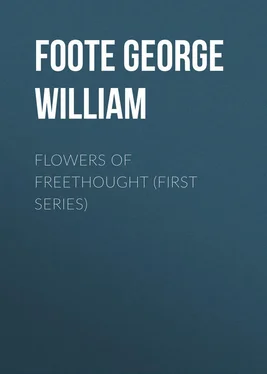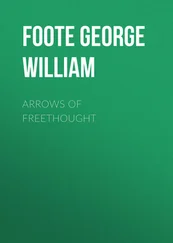George Foote - Flowers of Freethought (First Series)
Здесь есть возможность читать онлайн «George Foote - Flowers of Freethought (First Series)» — ознакомительный отрывок электронной книги совершенно бесплатно, а после прочтения отрывка купить полную версию. В некоторых случаях можно слушать аудио, скачать через торрент в формате fb2 и присутствует краткое содержание. Жанр: foreign_antique, foreign_prose, на английском языке. Описание произведения, (предисловие) а так же отзывы посетителей доступны на портале библиотеки ЛибКат.
- Название:Flowers of Freethought (First Series)
- Автор:
- Жанр:
- Год:неизвестен
- ISBN:нет данных
- Рейтинг книги:3 / 5. Голосов: 1
-
Избранное:Добавить в избранное
- Отзывы:
-
Ваша оценка:
- 60
- 1
- 2
- 3
- 4
- 5
Flowers of Freethought (First Series): краткое содержание, описание и аннотация
Предлагаем к чтению аннотацию, описание, краткое содержание или предисловие (зависит от того, что написал сам автор книги «Flowers of Freethought (First Series)»). Если вы не нашли необходимую информацию о книге — напишите в комментариях, мы постараемся отыскать её.
Flowers of Freethought (First Series) — читать онлайн ознакомительный отрывок
Ниже представлен текст книги, разбитый по страницам. Система сохранения места последней прочитанной страницы, позволяет с удобством читать онлайн бесплатно книгу «Flowers of Freethought (First Series)», без необходимости каждый раз заново искать на чём Вы остановились. Поставьте закладку, и сможете в любой момент перейти на страницу, на которой закончили чтение.
Интервал:
Закладка:
If earthquakes are the work of blind, unconscious Nature, it is idle to spend our breath in discussion or recrimination. Even regret is foolish. We have to take the world as we find it, with all its disadvantages, and make the best of a not too brilliant bargain. Instead of screaming we must study; instead of wailing we must reflect; and eventually, as we gain a deeper knowledge of the secrets of Nature, and a greater mastery over her forces, we shall be better able to foresee the approach of evil and to take precautionary measures against it.
But the standard teaching of England, to say nothing of less civilised nations, is not Naturalism but Theism. We are told that there is a God over all, and that he doeth all things well. On the practical side this deity is called Providence. It is Providence that sends fine weather, and Providence that sends bad weather; Providence that sends floods, and Providence that sends drought; Providence that favors us with a fine harvest, and Providence that blights the crops, reducing millions of people, as in Russia at this moment, to the most desperate shifts of self-preservation. It is Providence that saves Smith's precious life in a railway accident, and of course it is. Providence that smashes poor Jones, Brown and Robinson.
Now it will be observed that the favorable or adverse policy of Providence is quite irrespective of human conduct, There is no moral discrimination. If Grace Darling and Jack the Ripper were travelling by the same train, and it met with an accident, everybody knows that their chances of death are precisely equal. If there were any difference it would be in favor of Jack, who seems very careful of his own safety, and would probably take a seat in the least dangerous part of the train.
Some people, of course, and especially parsons, will contend that Providence does discriminate. They have already been heard to hint that the Russian famine is on account of the persecution of the Jews. But this act of brutality is the crime of the Government, and the famine falls upon multitudes of peasants who never saw a Jew in their lives. They have to suffer the pangs of hunger, but the Czar will not go without a single meal or a single bottle of champagne.
No doubt a pious idiot or two will go to the length of asserting or insinuating that the earthquake in Japan is a divine warning to the people, from the Mikado down to his meanest subject, that they are too slow in accepting Christianity. In fact there is a large collection of such pious idiots, only they are deterred by a wholesome fear of ridicule. Hundreds of thousands of people have seen Mr. Wilson Barrett in Claudian , without being in the least astonished that an earthquake, which ruins a whole city, should be got up for the hero's spiritual edification.
Let the pious idiots, however numerous, be swept aside, and let the Christian with a fair supply of brains in his skull consider Providence in the light of this earthquake. It is folly to pretend that the Japanese are particularly wicked at this moment. It is greater folly to pretend that the earthquake killed the most flagitious sinners. It slew like Jehovah's bandits in the land of Canaan, without regard to age, sex, or character. The terrible fact must be faced, that in a country not specially wicked, and in a portion of it not inhabited by select sinners, the Lord sent an earthquake to slay man, woman, and child, and if possible to "leave alive nothing that breatheth."
Lay your hand upon your heart, Christian, and honestly answer this question. Would you have done this deed? Of course not. Your cheek flames at the thought. You would rush to save the victims. You would soothe the dying and reverently bury the dead. Why then do you worship a Moloch who laughs at the writhings of his victims and drinks their tears like wine? See, they are working and playing; they are at business and pleasure; one is toiling to support the loved ones at home; another is sitting with them in peace and joy; another is wooing the maiden who is dearer to him than life itself; another is pondering some benevolent project; another is planning a law or a poem that shall be a blessing and a delight to posterity. And lo the mandate of Moloch goes forth, and "his word shall not return unto him void." Swifter than thought calamity falls upon the gay and busy scene. Hearts that throbbed with joy now quiver with agony. The husband folds his wife in a last embrace. The mother gathers her children like Niobe. The lover clasps in the midst of horror the maiden no longer coy. Homes are shaken to dust, halls fall in ruins, the very temples of the gods are shattered. Brains are dashed out, blood flows in streams, limbs are twisted, bodies are pinned by falling masonry, cries of anguish pierce the air, groans follow, and lastly silence. Moloch then retires to his inmost sanctuary, filled and sated with death and pain.
Is it not better, Christian friend, to defy Moloch instead of worshipping him? Is it not still better to regard this deity as the creation of fanciful ignorance? Is not existence a terror if Providence may swoop upon us with inevitable talons and irresistible beak? And does not life become sweeter when we see no cruel intelligence behind the catastrophes of nature?
STANLEY ON PROVIDENCE
Buckle, the historian of Civilisation, points out that superstition is most rampant where men are most oppressed by external nature. Wild and terrible surroundings breed fear and awe in the human mind. Those who lead adventurous lives are subject to the same law. Sailors, for instance, are proverbially superstitious, and military men are scarcely less so. The fighter is not always moral, but he is nearly always religious.
No one acquainted with this truth will be surprised at the piety of explorers. There is a striking exception in Sir Richard Burton, but we do not remember another. From the days of Mungo Park down to our own age, they have been remarkable for their religious temperaments. Had they remained at home, in quiet and safety, they might not have been conspicuous in this respect; but a life of constant adventure, of daily peril and hairbreadth escapes, developed their superstitious tendencies. It is so natural to feel our helplessness in solitude and danger, and perhaps in sickness. It is so easy to feel that our escape from a calamity that hemmed us in on every side was due to a providential hand.
Whether Stanley, who is now the cynosure of all eyes, began with any considerable stock of piety, is a question we have no means of determining; but we can quite understand how a very little would go a very long way in Africa, amid long and painful marches through unknown territory, the haunting peril of strange enemies, and the oppressive gloom of interminable forests. Indeed, if the great explorer had become as superstitious as the natives themselves, we could have forgiven it as a frailty incident to human nature in such trying circumstances. But when he brings his mental weakness home with him, and addresses Englishmen in the language of ideas calculated for the latitude of equatorial Africa, it becomes necessary to utter a protest. Stanley has had a good spell of rest in Egypt, and plenty of time to get rid of the "creeps." He should, therefore, have returned to Europe clothed and in his right mind. But instead of this he deliberately sits down and writes the following rubbish for an American magazine, with one eye on God above and the other on a handsome cheque below:
"Constrained at the darkest hour humbly to confess that without God's help I was helpless, I vowed a vow in the forest solitudes that I would confess his aid before men. Silence, as of death, was round about me; it was midnight; I was weakened by illness, prostrated by fatigue, and wan with anxiety for my white and black companions, whose fate was a mystery. In this physical and mental distress I besought God to give me back my people. Nine hours later we were exulting with a rapturous joy. In full view of all was the crimson flag with the crescent, and beneath its waving folds was the long-lost rear column."
Читать дальшеИнтервал:
Закладка:
Похожие книги на «Flowers of Freethought (First Series)»
Представляем Вашему вниманию похожие книги на «Flowers of Freethought (First Series)» списком для выбора. Мы отобрали схожую по названию и смыслу литературу в надежде предоставить читателям больше вариантов отыскать новые, интересные, ещё непрочитанные произведения.
Обсуждение, отзывы о книге «Flowers of Freethought (First Series)» и просто собственные мнения читателей. Оставьте ваши комментарии, напишите, что Вы думаете о произведении, его смысле или главных героях. Укажите что конкретно понравилось, а что нет, и почему Вы так считаете.












